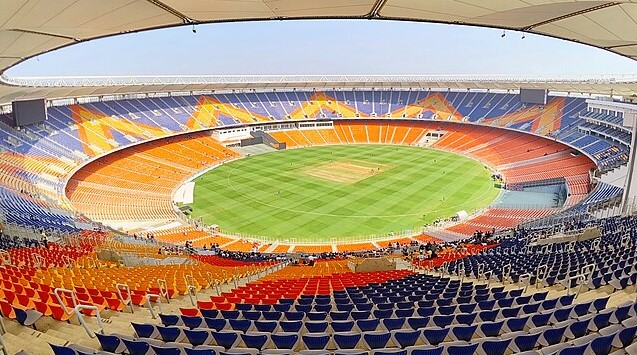What is the Boundary Length of Narendra Modi Stadium? The Narendra Modi Stadium, formerly known as the Sardar Vallabhbhai Patel Stadium, is not just a cricket ground—it’s a monumental piece of sporting infrastructure. Located in Ahmedabad, India, this stadium holds the title of the largest cricket stadium in the world by seating capacity, accommodating over 132,000 spectators. It is a hub for international cricket, hosting major tournaments, including Test matches, One-Day Internationals, and T20 games, as well as events for other sports.
What is the Boundary Length of Narendra Modi Stadium?
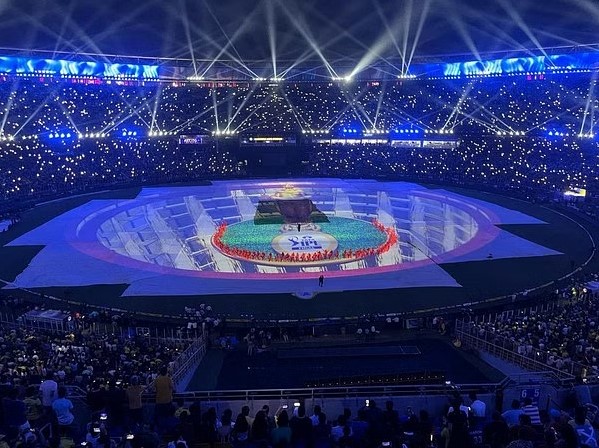
While the size and grandeur of the stadium are awe-inspiring, one of the key aspects that cricket enthusiasts often discuss is the boundary length. The boundary length of a cricket ground plays a critical role in determining the type of game—whether it will favor the batsmen or the bowlers. A longer boundary can make hitting big sixes more difficult, while a shorter boundary might see plenty of high scores.
In this article, we will delve into the specifics of the boundary length of Narendra Modi Stadium, along with other essential details that make this venue truly special.
Boundary Length of Narendra Modi Stadium
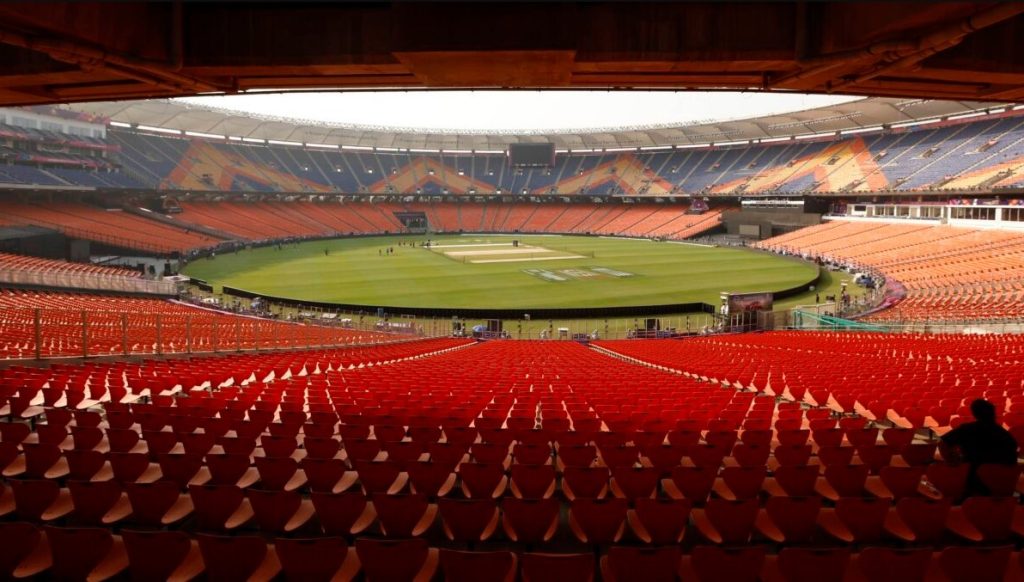
The boundary length at the Narendra Modi Stadium varies slightly, depending on where the ball is hit and the specific measurement method used. However, in general terms:
- Straight Boundaries: The distance is approximately 65-70 meters.
- Square Boundaries: The distance is slightly longer, ranging between 70-75 meters.
These measurements make the boundary length at Narendra Modi Stadium moderately long in comparison to other international cricket venues. Grounds like Eden Gardens in Kolkata or the Melbourne Cricket Ground (MCG) have slightly longer square boundaries, but the Narendra Modi Stadium still provides enough challenge for batsmen to target the boundaries.
For major matches, the boundary lines may be adjusted slightly depending on the pitch, but the range mentioned above holds true for the standard configuration of the ground.
| Known as | Narendra Modi Stadium, Motera Stadium, Sardar Patel Stadium, Gujarat Stadium |
| Established in | 1982 and 2020 (renovated) |
| Association Name | Gujarat Cricket Association |
| Field Size | 160 m X 140 m |
| Boundary length in meters | Straight boundary length is 75 meters and square boundary length is 60 meters on average. |
| Inaugurated by | Then Indian President Ram Nath Kovind |
| Capacity | 1,32,000 |
| Home Team | Indian National Team, Gujarat Lions, Gujarat domestic team |
| Ends | Adani Pavilion End and Reliance End |
| Boundary Size | 75 m on average for straight boundaries 60 m on average for square boundaries |
| Time Zone | UTC/GMT +5:30 hours |
| Location | https://goo.gl/maps/HayrNebHxJJSUj4Y9 |
Why Boundary Length Matters in Cricket
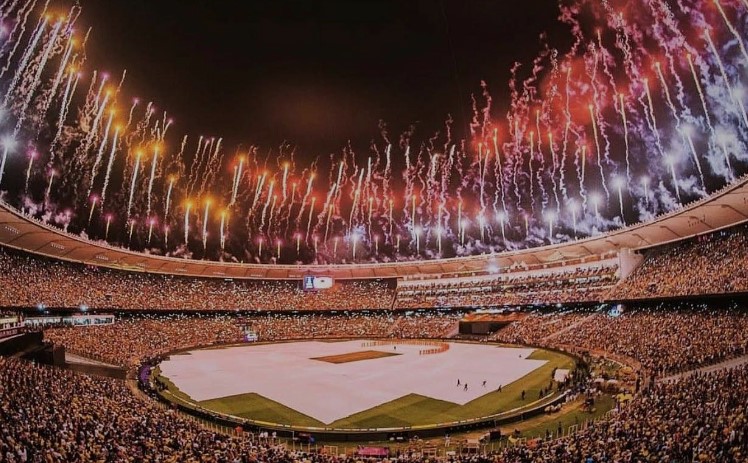
The boundary length plays a significant role in how a cricket match unfolds. A longer boundary generally helps the bowlers by discouraging big hitting, while a shorter boundary tends to favor aggressive batting, with sixes being easier to hit. At the Narendra Modi Stadium, with boundary lengths of 65-75 meters, batsmen have to be skillful and strategic, as the dimensions are not excessively short, but still within a range that allows for explosive shots.
Other Key Features of Narendra Modi Stadium
Apart from its boundary length, the Narendra Modi Stadium is a world-class facility with several key features:
1. Capacity and Infrastructure
- The stadium can hold a staggering 132,000 spectators, making it the largest cricket stadium in the world. This is a significant upgrade from its previous capacity of 54,000 before the renovation, which was completed in 2020.
- The stadium boasts state-of-the-art facilities, including modern dressing rooms, practice areas, media zones, and VIP lounges, ensuring comfort and convenience for both players and fans.
2. Modern Playing Surface
- The pitch at the Narendra Modi Stadium is known for its excellent preparation and adaptability to different formats of the game. It has been host to various international matches and domestic fixtures, providing competitive wickets that cater to both fast bowlers and spinners.
3. Floodlights and Technology
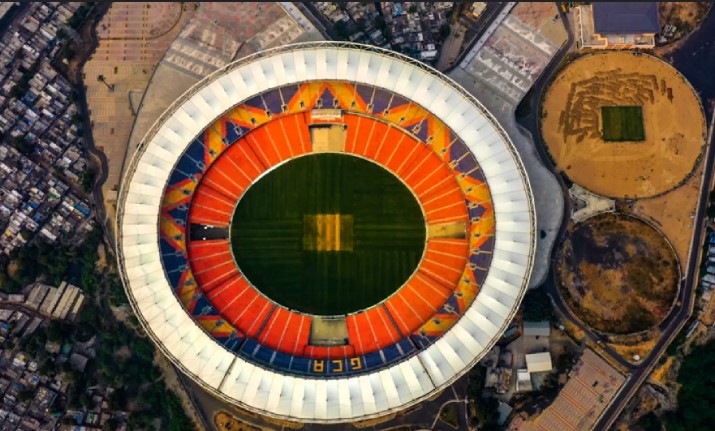
- The stadium is equipped with modern floodlighting systems, providing perfect visibility for night games. Additionally, the venue has advanced technology infrastructure, including giant screens and sophisticated broadcasting facilities to cater to a global audience.
4. Location and Accessibility
- Situated in Sardar Vallabhbhai Patel Sports Complex near the Ahmadabad city center, the stadium is easily accessible for fans and players alike. Its location near major transportation hubs makes it an attractive venue for international and domestic fixtures.
Significant Matches at Narendra Modi Stadium
Since its reopening, the Narendra Modi Stadium has hosted a number of iconic cricket matches:
- India vs England, 2021: The stadium became a focal point for Test cricket when it hosted the third and fourth matches of the 2021 India-England series, which were part of the ICC World Test Championship.
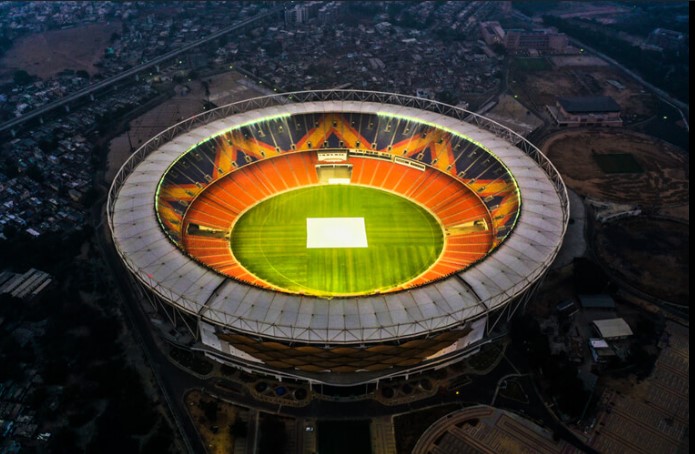
- 2021 IPL Final: The stadium was the venue for the final of the Indian Premier League (IPL) 2021, where Chennai Super Kings defeated Kolkata Knight Riders to claim their fourth IPL title.
- Inaugural Day-Night Test: In December 2020, the stadium hosted its first-ever Day-Night Test match, which saw India and Australia battle in a historic pink-ball match.
The Narendra Modi Stadium is a marvel of modern-day cricket infrastructure. With boundary lengths ranging from 65 to 75 meters, it provides an ideal mix of challenge and opportunity for batsmen, while not favoring one side over the other. It’s a place where cricketing history is made, with world-class facilities and a truly iconic status in global sport.
Whether you’re attending a match in person or watching it from the comfort of your home, the sheer scale and quality of the Narendra Modi Stadium ensure it remains a landmark in the world of cricket, and its boundary lengths are just one of the many factors contributing to its worldwide acclaim.
